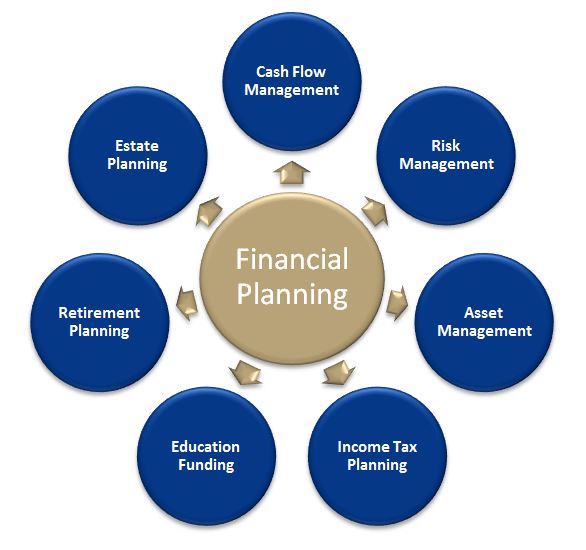Financial Planning
The objective of financial planning is to ensure that one has sufficiently funded for different life goals while taking into account risk tolerance, time horizon, and current and future tax laws. By assisting our clients through this comprehensive process, we strive to have them achieve the optimal alignment between their wealth, their values, and their goals. We provide specific recommendations that are independent of any conflicts of interest. We update financial plans for our clients regularly, taking into account any changes in a client’s situation and then determine if any revisions need to be made.

Financial Planning Process:
1. Cash Flow Management
Successfully managing one’s cash is essential in making sure one stays on course to meeting their financial goals such as buying a home, putting children through college, and being able to retire. It is also important that one sets up an emergency fund to provide for unexpected expenses, such as a job loss, a long-term illness, or a costly home repair.
2. Risk Management
Protecting one’s assets is important in the event of an untimely death, a disability, or a catastrophic event. It is important that a financial plan takes into consideration the risks that one cannot afford to take. In a portfolio, one diversifies their holdings so as to reduce their overall risk and the same needs to be done with respect to protecting one’s overall financial situation. We help clients determine the proper amount of insurance coverage (life, disability, long-term care, homeowners, automobile, umbrella, and earthquake) to help ensure that their goals are still satisfied.
3. Asset Management
This represents the ongoing management of portfolios in order to help meet a client’s specified investment goals. In this process, identifying the proper asset allocation by taking into account one’s risk tolerance and time horizon is vital to successfully develop a diversified strategy. This diversification is necessary to help ensure suitable growth of the client’s portfolio, as well as to preserve the portfolio from various systemic and non-systemic risks.
4. Income Tax Planning
The purpose of income tax planning has two main components: to minimize overall tax liability and to accomplish one’s financial goal with minimal tax consequences. We help clients develop and implement appropriate strategies to reduce, affect the timing of, and shift either current or future income tax liabilities. This planning is essential in order to determine how to accomplish all of the other parts of one’s financial plan in the most tax-efficient strategy possible.
5. Education Funding
Providing for a child’s college education can be an expensive goal to fund for, given that the costs are increasing at a rate higher than inflation. Educational planning involves designing an investment strategy that specifically addresses the needs of your family by utilizing the various plans available. We help to estimate what those potential costs will be by taking into account when the child will start college, the number of years you anticipate them being in school, the type of school (public versus private), and the assumed inflation rate and account rate of return.
6. Retirement Planning
This is likely the most expensive goal to sufficiently fund for. Given the number of baby boomers retiring in the next several years, and with the solvency of the Social Security system being uncertain, one has to rely more on their personal assets to ensure a comfortable retirement. The goal for financial independence during retirement is important to most people and they want to make sure they can remain retired.
7. Estate Planning
This is the process of analyzing an individual’s goals with respect to the disposition of their assets at death and then creating and implementing the plans and strategies both during the individual’s life and at death to help ensure that those wishes are fulfilled. Estate planning involves the development of strategies for protecting your assets, distributing them according to your wishes, and otherwise providing for your family. A carefully developed estate plan can help accelerate the distribution of your assets as well as potentially save your heirs from paying estate taxes.
Steward Partners Investment Advisory offers a wide array of advisory services to its clients, each of which may create a different type of relationship with different obligations to you. Please consult with your Financial Advisor to understand these differences. Please visit us at https://adviserinfo.sec.gov/Firm/283004 for Steward Partners Investment Advisory or consult with your Financial Advisor to understand these differences.

